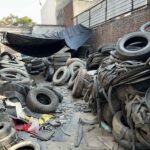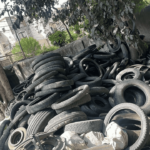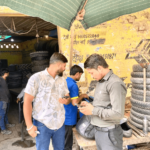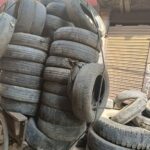Objective: Educating the informal sectors/clusters about the hazards of the Tyre Waste and providing opportunities to integrate with AWS as Formalised Waste Aggregators.
On this World Environment Day 2024, all the 192 nations are witnessing a plenitude of events with a focus on land restoration, desertification and drought resilience. We are slowly inching towards the halfway mark during this UN Decade on Ecosystem Restoration (2021-2030). Therefore, it is a clarion call for all volunteers, agencies, corporates, participants globally and in India to work perseveringly for the protection and revival of global ecosystems around the world, thereby together achieving the Sustainable Development Goals.
We at Allied Waste Solutions Private Limited (AWS) work in the sphere of Waste Management, i.e., Collection, channelization and Recycling of E-Waste, Plastic Waste, Tyre Waste, Battery Waste, Used Oil, End of Life Vehicles, amongst others.
The Allied Waste Solutions’ Tyre Operations and Supply Chain Management (T-OSCM) team pan-India understands that there is a pressing need to execute ground-level awareness programs amongst the informal sector clusters and educate them about integrating with formal recycling processes for the treatment of hazardous tyre waste.
To celebrate the World Environment Day 2024 ~ “Our Land. Our Future. We Are #GenerationRestoration”, the AWS’ Tyre Waste Operations team had volunteered for a fortnight-long Awareness drives across 10+ cities that started on 26th May 2024 and running till 7th June 2024, under the aegis of the company’s “Small Act, Big Impact” campaign, with an aim to touch base with thousands of informal sector workers, contractors, waste pickers, Informal waste clusters, retreaders, etc., towards spreading awareness on the following themes:
- Environmental Protection: Proper disposal and recycling of tyre wastes prevent environmental pollution. Informal methods often lead to burning or illegal dumping, which can cause soil, water, and air pollution.
- Health and Safety: Informal recycling methods can expose workers to hazardous materials and unsafe working conditions. Formal processes ensure safer handling, reducing health risks.
- Resource Efficiency: Tyres contain valuable materials like rubber, steel, and fabric. Formal recycling ensures these materials are efficiently recovered and reused, reducing the need for virgin resources.
- Regulatory Compliance: Integrating with formal recycling processes helps informal sector players comply with environmental regulations, avoiding legal penalties and promoting sustainable practices.
- Economic Benefits: Formal recycling can create jobs and provide income through the sale of recycled materials. Awareness can help informal workers transition into more stable and profitable employment within the formal sector.
- Quality and Standards: Formal recycling processes adhere to standards that ensure the quality of recycled materials, making them more marketable and useful for various industrial applications.
- Community Well-being: Proper waste management reduces the community’s exposure to hazardous substances, improving overall health and quality of life.
- Global Impact: Tyre waste is a global issue. Integrating informal sectors into formal recycling helps countries meet international environmental commitments and contributes to global sustainability goals.
Overall, raising awareness among informal sector players about the benefits and methods of integrating with formal recycling processes is essential for achieving sustainable waste management and environmental protection.
In case of any queries or for business associations, please call us on +91-120-699-3119
(Mon – Fri, 10 AM – 6 PM), or write to info@alliedwastesolutions.com.
Here are some photographs from our awareness-building exercises at Delhi, Noida & Greater Noida, Ghaziabad, Gurgaon, Manesar, Meerut, Ludhiana, Karnal, Ambala, Chennai and Bengaluru.



















